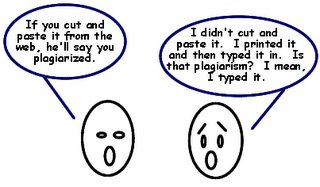 I keep hearing about plagiarism. Yesterday, there were reports on the news about how schools are struggling to control the use of mobile phones in exams.
I keep hearing about plagiarism. Yesterday, there were reports on the news about how schools are struggling to control the use of mobile phones in exams. Am I the stupid one or is it really simple? If someone has a mobile phone in an exam and it goes off, then fail them. There are schools that are installing mobile blockers and I read on Dr Karl (see links) that you can make paint that blocks mobile signals.
But it's simpler than even that. Why do teachers pussyfoot around? If a student refuses to give up their phone (and many will be excluded rather than hand it over, don't let them in the exam room, get their parents on the phone and tell them. I have seen teachers in exams ignore students talking and basically treating exams in a fairly cavalier manner. It's not rocket science surely?
Mobile phones and such devices are all well and good, however there is still the problem of plagiarism in written coursework. Exam boards complain that students are fooling the system by simply cutting and pasting work from the internet.
I simply can't believe it. It seems to me that, in order to not notice plagiarised work, you need to do lots of things.
1. Not know the skill levels of your own pupils and therefore not be able to recognise their writing style or such things the range of their vocabulary.
2. Set essay questions that are so broad or so basic that students can easily find an essay on the internet that exactly answer them.
3. Be totally unable to use a computer and be completely unaware of what Google is.
A few years ago I was teaching an A level in creative writing. One student handed in a piece of suspicious work. I was already suspicious of him because he had been taught by two other English teachers in my school in Year 10 and Year 11 and, for each, had handed in work that was blatantly cut and pasted from a web site. He thought he could get away with doing the same with me. I typed a six word string from his story (which wasn't actually very good, being a piece of Deep Space Nine fan fiction) and instantly found his source. I printed it off, stapled it to his copy and gave it to the head of the sixth form. Nothing was done to sanction the student and six months later, at the request/insistence of the same Head of Sixth Form, I had to give up my after-school time to sit with him when he still hadn't written anything two days before his final deadline. I guess this is why he thought he could try his trick three times. By cheating he got the personal backing of his year head and extra personal tuition.
The bottom line is that this student had read about how to copy from the internet somehere, or someone had told him how to do it. He though he was cleverer than me. He thought I'd never heard of Deep Space Nine, or the internet. He wasn;t even clever enough to be obscure. I typed the words creative writing into Google and his 'original' work was on the sixth site on the results list. And I just don't buy that students can outwit their teachers. By definition, the teacher is cleverer. It doesn't seem possible. Unless...
...the teachers are complicit. In the English courses I have taught, students have to produce roughly five pieces of extended written coursework. It's amazing. But to get a fifteen or sixteen year old to actually come up with five pieces of work in two years is often a real struggle. I haven't known a time when deadlines are approaching and I haven't been desperately trying to get students to catch up with missing work, sitting with them in an evening reteaching them the plot points of An Inspector Calls or Twelfth Night,, negotiating them time away from other lessons (whose teachers are themselves trying to get the missing work out of recalcitrants), phoning and writing to parents, phoning and writing to them again. And again.
I have a stash of 'short' coursework tasks. A couple of pages summary of a novel or play, a page or two of dialogue and a series of questions that, when answered, look a bit like a low-grade essay. They can be done in an evening or an afternoon. Because if students are missing coursework, the blame is put onto me. Not the parents, who seem singularly uninterested in their child's achievement. Not the system, which gives nobody any time to catch up, and especially not the students themselves. I have often received orders from above. There is no excuse for missing coursework. Even from the students whom, at sixteen, still roll up to class without a pen, or who cannot be given anything to take home because they will always lose or discard it. Even the ones who are so unmotivated, they often don't get out of bed.
In these situations, is it not possible for a teacher to eyeball a piece of finished coursework and simply experience relief? Who cares where it came from? Who cares that it reads like it was written by Slavoj Zizek? Surely it is okay for the teacher to pretend they didn't notice or suspect its origins, mark it and pass it on? One more impossible job ticked off.
No comments:
Post a Comment